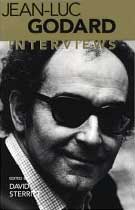David Sterritt
David Sterritt | |
|---|---|
 David Sterritt | |
| Born | September 11, 1944 United States |
| Occupation(s) | Film critic,author,scholar |
| Partner | Mikita Brottman |

David Sterritt(born September 11, 1944) is afilm critic,authorandscholar.He is most notable for his work onAlfred HitchcockandJean-Luc Godard,and his many years as the Film Critic forThe Christian Science Monitor,[1]where, from 1968 until his retirement in 2005, he championed avant garde cinema, theater and music. He has a Ph.D. in Cinema Studies fromNew York Universityand is the Chairman of theNational Society of Film Critics.[2]
Sterritt has also written influentially on the film and culture of the 1950s, theBeat Generation,French New Wavecinema,Robert Altman,Spike LeeandTerry Gilliam,and the TV series,The Honeymooners.
Sterritt participated in the2012Sight & Soundcritics' poll,where he listed his ten favorite films as follows:2001: A Space Odyssey,Antonio das Mortes,Au hasard Balthazar,The Crowd,Out 1: Spectre,A Page of Madness,Vagabond,Vertigo,Wavelength,andA Woman Under the Influence.[3]
Career
[edit]Sterritt began his career as a film critic atBoston After Dark(now theBoston Phoenix), where he was Chief Editor. He then moved toThe Christian Science Monitor,where he worked as the newspaper's Film Critic and Special Correspondent.[1]During his tenure at the Monitor, Sterritt held a number of additional appointments. From 1978-1980 he was the Film Critic forAll Things Considered,onNational Public Radio.From 1969 to 1973, he was the Boston Theater Critic forVariety,and he sat on the selection committee for theNew York Film Festivalfrom 1988 to 1992. Between 1994 and 2002 he was Senior Critic at the National Critics Institute of theEugene O'Neill Theater Center,and he served as the video critic forIslandsmagazine from 2000-2003. From 2005-2007 he was Programming Associate at the Makor/Steinhardt Center of the92nd Street Y.He is a member of the National Editorial Advisory Group ofTikkun,is the Editor in Chief ofQuarterly Review of Film and Video,and the Chief Book Critic forFilm Quarterly.
Sterritt's writings on film and film culture have also appeared inMovieMakerin an article aboutindependent film,[4]Senses of Cinemain an article about Iranian filmmakerAbbas Kiarostami,[5]Cinéastein an article about French filmmakerAlain Renais,[6]andBeliefnetin an article aboutSteven Spielberg'sWar of the Worlds.[7]
In 1998 Sterritt edited a book of interviews and conversations with Godard by critics, scholars, and journalists, from the 1960s to the 1990s, illuminating the filmmaker's life, work, and ideas.[1]
Sterritt is particularly well known for his careful considerations of films with a spiritual connection, such asMartin Scorsese'sThe Last Temptation of Christ(1988), andMel Gibson'sThe Passion of the Christ(2004).[8][9]According to Sterritt, "Scorsese has worshiped at two altars throughout his adult life: the altar of Christianity and the altar of cinema."[8]In 2004CNNquoted Sterritt about Gibson's controversial film, which some people protested due its troubling portrayal of Jews, as saying the film "certainly leaves the door open for anybody who comes in already contaminated with the germs ofanti-Semitism.This will feed those germs. "[9]
From 1999-2015 Sterritt was the Co-Chair, withWilliam Luhr,of theColumbia UniversitySeminar on Cinema and Interdisciplinary Interpretation. He is currently on the Film Studies Faculty atColumbia University's Graduate Film Division, and Adjunct Faculty at theMaryland Institute College of Artin the Department of Language, Literature and Culture and the Department ofArt History.He is also Distinguished Visiting Faculty in the Goldring Arts Journalism Program at theS.I. Newhouse School of Public CommunicationsatSyracuse University,and Professor Emeritus of Theater and Film atLong Island University,[1]where he taught from 1993 to 2005, obtaining tenure in 1998.
Personal life
[edit]Sterritt is the partner of psychoanalyst, author and cultural criticMikita Brottman.They wrote a review together ofGaspar Noé's 2002 French filmIrréversibleforFilm Quarterly.[10]
Books
[edit]- Guiltless Pleasures: A David Sterritt Film Reader
- Mad to Be Saved: The Beats, the 50s, and Film
- Screening the Beats: Media Culture and the Beat Sensibility
- The Honeymooners (TV Milestones)
- The Films of Alfred Hitchcock (Cambridge Film Classics)
- The Films of Jean-Luc Godard: Seeing the Invisible (Cambridge Film Classics)
- Jean-Luc Godard Interviews(University Press of Mississippi)
References
[edit]- ^abcdeSterritt, David, ed. (1998).Jean-Luc Godard: Interviews.University Press of Mississippi.ISBN9781578060801.RetrievedMay 12,2022.
- ^Kay, Jeremy (September 23, 2009)."National Society Of Film Critics to announce winners on January 3, 2010".Screen Daily.RetrievedMay 13,2022.
- ^"The Greatest Films of All Time 2012: David Sterritt".BFI.2012. Archived fromthe originalon August 18, 2016.RetrievedMay 13,2022.
- ^Sterritt, David (January 15, 2006)."Year of the Indie: Indies, studios and the state of offbeat moviemaking".Moviemaker.Archived fromthe originalon October 18, 2010.RetrievedSeptember 25,2009.
- ^Sterritt, David (2000)."Taste of Kierostami".Senses of Cinema.Archived fromthe originalon February 8, 2007.
- ^Sterritt, David (Fall 2008)."Four Alain Renais Films on DVD".Cinéaste.Archived fromthe originalon September 28, 2009.RetrievedSeptember 28,2009.
- ^Sterritt, David (July 2005)."Playing on Our Fears".Beliefnet.
- ^abO’Brien, Catherine (2018).Martin Scorsese's Divine Comedy: Movies and Religion.Bloomsbury Publishing.pp. 127–151.RetrievedMay 13,2022.
- ^abBlitzer, Wolf (February 25, 2004)."Viewers react passionately to Gibson's film".CNN.RetrievedMay 13,2022.
- ^Brottman, Mikita; Sterritt, David."Review:Irréversible".Film Quarterly.Archived fromthe originalon June 4, 2009.RetrievedJune 4,2009.
